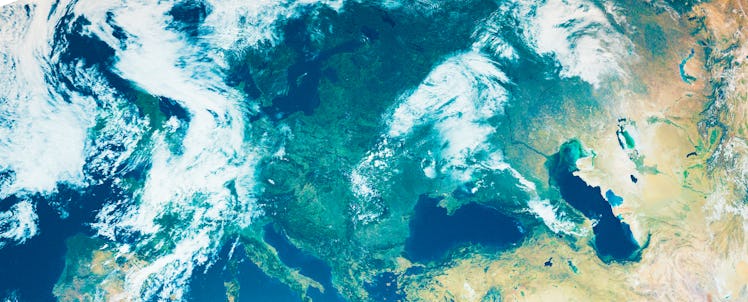Earth Day Fails Kids. It’s Time for Science Day.
Amid a pandemic, let's recognize that nature is not our friend and celebrate science, the best idea humans have ever had.

When I was a kid, we celebrated Earth Day by emerging from our classrooms to play peekaboo with the crocus poking up through the still-cold New England soil — this was a quarter-century ago when the chill loitered in the landfilled parks and campuses of Boston until commencement season. Like the first participants in Earth Day, who emerged from kindergartens and grade schools and colleges and (unlikely as it sounds) the Republican Cloakroom to rally peacefully for environmental reform, we took a moment to recognize the beauty of collective inheritance. Then we went back inside, fingers numb, and watched our teacher crank the thermostat.
Earth Day organizer Denis Hayes claimed loudly (and not without hubris) that the event he created was the “largest secular holiday in the world,” but that was always a bit disingenuous. The philosophical underpinnings of the environmental movement in America and in California, where things kicked off in earnest after the Santa Barbara oil spill of 1969, are deeply entwined with religion. If Thoreau, Emerson, and California’s own Muir shared a purpose, it was to deliver a spiritualist counterpunch to the fetishization of work and consumption endemic to a nation purportedly founded on protestant ideals. Put slightly differently, Earth Day is the photo negative of a religious holiday. It’s made of the same stuff. It teaches us to see flowers as a metaphor and nature as an allegory for the unattainable.
But nature is not an allegory. Nature is what happens.
COVID-19, a mutable coronavirus gestated in communities of Chinese bats, is nature. The frothy sputum that fills the lungs of the dying is nature. The bacteria eating at the flesh of the recently buried are nature too. Nature is not merely revealed scripture, an extended metaphor for collective purpose, conscience, or anti-corporate collectivism, and the Earth is not merely a flower-y spot in an otherwise un-landscaped universe. The Earth is a complicated planet and nature is a complicated system — one that we understand through science.
Let’s be clear, there’s nothing wrong with teaching children to celebrate the Earth. As anyone who has ever seen a nature documentary knows, it’s quite a place. But Earth Day has always been a political moment and those politics have proven ineffective if not counterproductive. Today, Earth Day is a referendum on the looming threat of climbing change, which makes sense for adults but teaches children to fear the un-manufactured world, and on the impact of companies American tax dollars have, are, and will continue to prop up. It’s fitting that Earth Day is often celebrated by having children recycle. Recycling — for those keeping track — is a wildly inefficient and ineffectual way to save the environment.
If the current pandemic has taught us anything it is this: We cannot fight what we cannot understand. The opposite is true as well. We do not protect what we do not understand. And we seem to be taking pride in understanding less and less. Looking to those protesting stay-at-home orders and to the impending public health crisis in Georgia, it’s tempting to deploy the words, cribbed from the comic Pogo, that were repeated and repeated in 1970. “We have met the enemy and he is us.” It’s more tempting to not engage with what those words suggest: the necessity of conflict.
We don’t need to celebrate flowers. We need to celebrate the people that work to understand flowers. We don’t need to celebrate landscapes. We need to celebrate the people that work to understand their hidden mechanics. We don’t need to celebrate the blueness of the sky. We need to celebrate those spending their lives monitoring slight changes to that tint — alterations not apparent to our naked eyes.
By the same token, we need to point out the profound villainy that is the refusal to see. Funding cuts to science programs. The militarization of NASA. The defunding of pandemic monitoring systems.
Alexander von Humboldt, the German polymath who discovered modern fertilizer, the transit of Mercury, and just about everything else famously remarked that “The most dangerous worldviews are the worldviews of those who have never viewed the world.” He knew full well that the ignorant will zealously defend their right to ignorance. But he was also suggesting something a bit grander and more empowering. The act of truly looking is a prerequisite for progress.
Earth Day, as it is currently celebrated, isn’t about looking. It’s a glance. That’s better than nothing, but it’s not much. So let’s have a Science Day. Let’s celebrate the act of looking far more closely. Peering. Inspecting. Dissecting. Vivisecting. Rather than celebrating abstractions, let’s celebrate our ability to comprehend our collective position in a not-entirely closed system we must be entirely open to if we want to deliver children a better future. Instead of showing kids a flower, let’s show them the petal-like spike glycoproteins of a virus and a way forward.
Then let’s also show them a flower. No child should be denied a tulip.